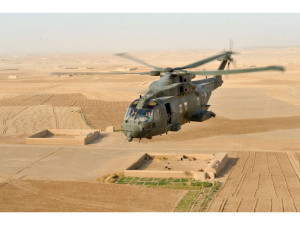The Merlin HC3 helicopters part of the Britain’s overseas operations in Afghanistan, have carried out their last operations. This comes after a solid four years of providing support to British troops on the front line.
The Merlins have clocked up over 18,000 hours of flying within the extreme heat and dust of Helmand province. This has included the choppers carrying more than 7,900 tonnes of kit, constantly helping out those who desperately need it. However, its primary function is to transport soldiers, which it has done since 2009. They estimate that during its operational duty within Afghanistan it carried around 130,000 people during the four year stint.
Though as the numbers of troops within Afghanistan falls primarily a result of the military hand over, it has become clear it is the right time to pull back some of its air support. The number of UK bases with Helmand have fallen from 137 to just 11 this – further supporting the decision to retreat its helicopters.
The requisite for helicopters in theatre has fallen by around 40 per cent in the past three years. In 2010, helicopter support hours were totalled around 2,300 hours a month – a figure that has now dramatically decreased to approximately 1,350 hours a month.
As a result, the Merlin fleet and its crews can now be returned to the UK to prepare for prospective future missions.
The finale of Merlin operations in Afghanistan is the newest manifestation of the shifting role by British and other international forces, as the process of transition to an Afghan security lead continues. This also comes in light of Prime Minister David Cameron, announcing the number the British forces in Afghanistan will fall to around 5,200 by the end of this year, which was peaked at 9,500 in 2012.
Defence Secretary Philip Hammond backed this move, as he said:
“The Afghan National Security Forces are growing in capability and their success is driving the transition and redeployment process. Afghan security forces are on track to take on responsibility for all operations across the country this summer and their success means we have been able to reduce the number of our bases – with consequently fewer helicopters needed to serve them.
“The Merlin fleet has served with distinction in Afghanistan but our role has changed significantly in recent months and returning the Merlin fleet now is a key element of our orderly drawdown from Afghanistan.
“British forces on the ground still retain appropriate capability to move personnel and equipment by air as required, as well as support our Afghan and ISAF colleagues. Our troops will continue to be resourced properly for the roles they are conducting and our drawdown of equipment will be done in a way that does not compromise our ongoing operations or put our personnel at additional risk.”
With the fall back underway engineers in Camp Bastion are now hard at work preparing the Merlin helicopters for their journey back to the UK. Each helicopter must go through a rigorous tests making sure that they are coming home in the best condition. Each one will have its rotor blades and tail removed and will undergo a full “bio-wash” to remove dust and insects. Then they will be loaded onto a wheeled transport unit that will be driven on board a huge RAF C-17 Globemaster aircraft for the trip home.
After their anticipated return to RAF Benson, the Merlins will join the rest of the Merlin Force with the ongoing transition in helping the, Joint Helicopter Command’s Royal Navy Commando Helicopter Force.
The maritime force is trained and equipped for expeditionary joint operations and the Merlins will be prepared for their new role in supporting amphibious operations. RAF personnel are currently training the Royal Navy aircrew and engineers on the operation and maintenance of the technologically advanced helicopter, which is due to move to a maritime role by 2015









